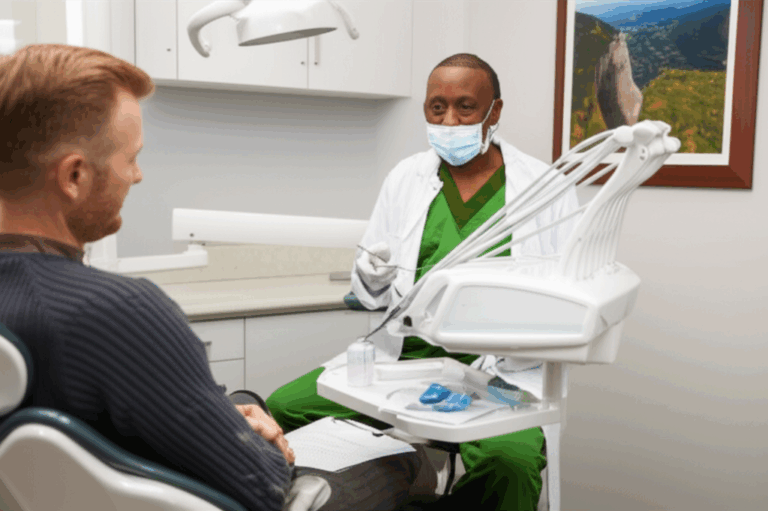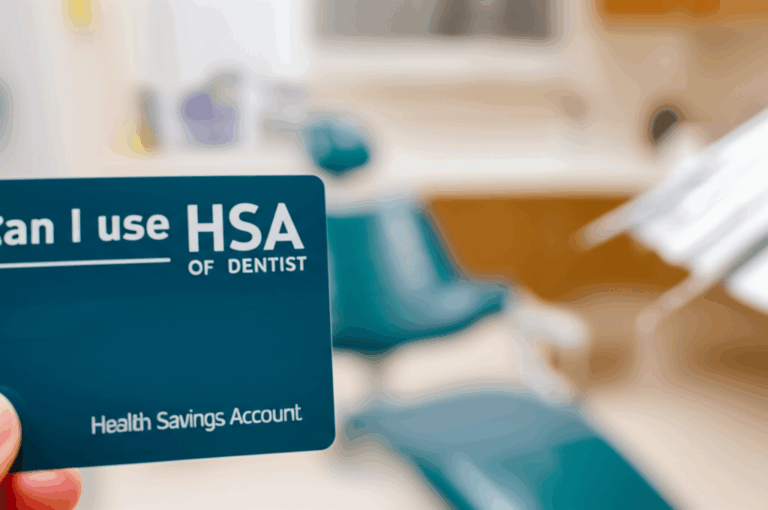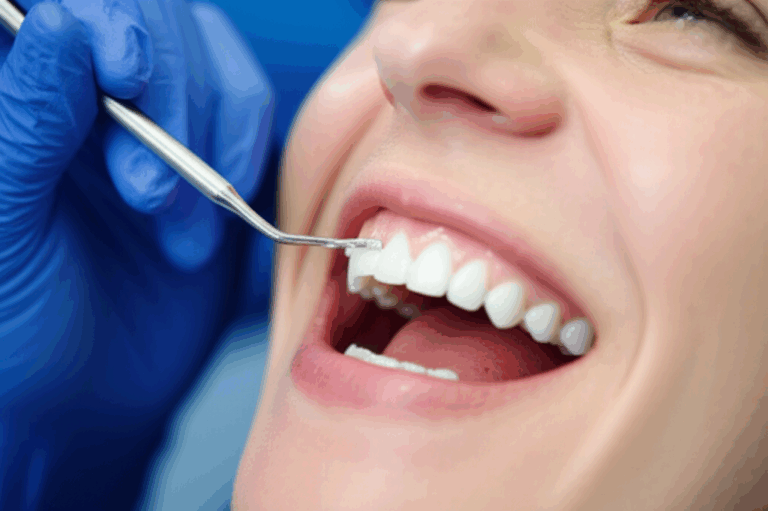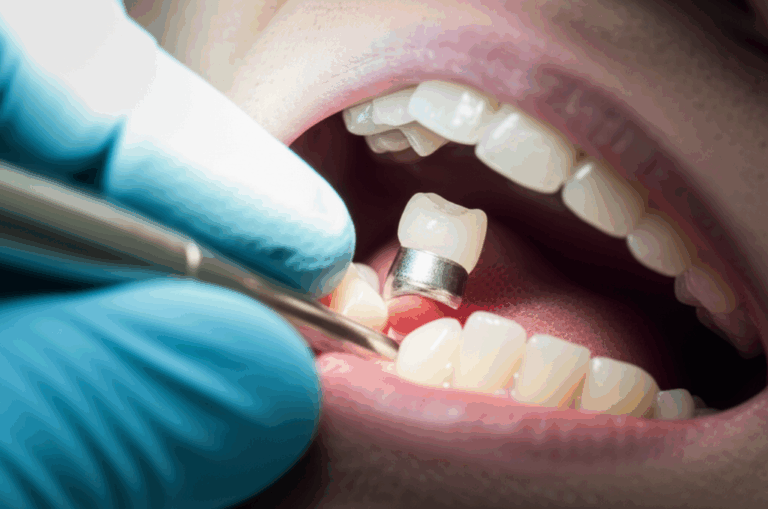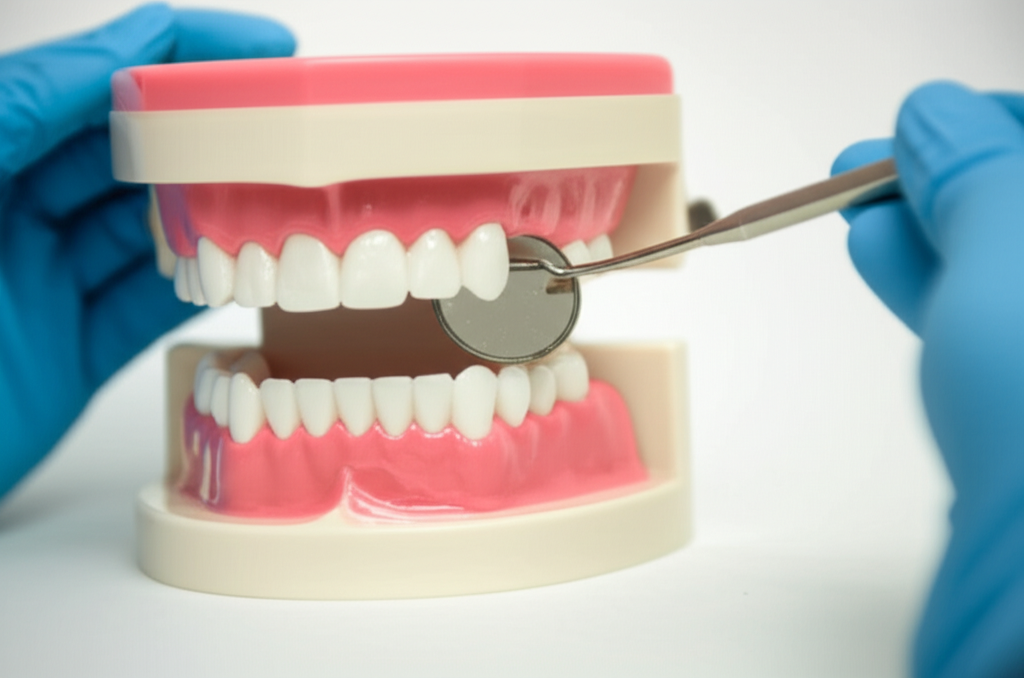
Dentist or Doctor? A Symptom-Based Guide to Your Oral & Facial Pain
Table of Contents
- Tooth-Specific Pain & Problems
- Gum & Soft Tissue Issues (Primarily Oral)
- Jaw Pain of Suspected Dental Origin
- General Systemic Symptoms
- Broader Facial & Head Pain
- Oral Sores & Lesions (Often Medical)
- Jaw Pain of Suspected Medical Origin
- Ambiguous Symptoms
- The Oral-Systemic Health Link
- When to Seek a Referral
- Dental Emergencies (Call Dentist Immediately)
- Medical Emergencies (Go to ER/Urgent Care Immediately)
Introduction
I can’t tell you how many times I’ve sat there with a throbbing ache in my jaw or a sore spot in my mouth, wondering, “Do I call my dentist—or is this something for my regular doctor?” If you’re in the same boat right now, trust me, you’re not alone. Mouth and face problems can make it confusing to know whether to see a dentist or a doctor.
From dealing with my own teeth, talking with professionals (including advice from trusted dentists like Dr. Joe Dental), and doing my own research, I’ve found that knowing who to turn to—and when—matters a lot. Going to the right person quickly can stop your pain, save you money, and even be really important for your health.
This guide is my way of making these choices easy, simple, and in normal words. I’ll walk you through common symptoms, share what each could mean, and help you figure out the grey areas between dentists and doctors—so you can handle your health without second-guessing yourself.
When to Definitely See a Dentist
After years of going to the dentist (and sometimes putting it off—let’s be honest), I’ve started to notice which problems should always go to the people with the little mirrors. Here’s what I’ve learned from my life and from the pros.
Tooth-Specific Pain & Problems
Nothing hurts quite like a toothache. If pain is only in one tooth—especially if it’s sharp, pounding, or gets worse with hot, cold, or sweet foods—I always make a dentist appointment. Once, after biting down on a popcorn kernel, I chipped a tooth. That’s not something my family doctor could fix.
- Lasting Toothache: Sensitive to temperature or sweets? The dentist is the one to see. These problems usually mean a cavity, a cracked tooth, or maybe something worse under the surface.
- Cracked, Chipped, or Broken Tooth: For me, if I see or feel a jagged tooth, I book a dentist visit fast.
- Lost Filling or Crown, Adult Tooth Feels Loose: Always a dentist job.
- Pain When Biting or Chewing: Usually a sign something’s wrong with a tooth—could be an abscess or weak spot.
It still surprises me how quickly a dental lab—like a crown and bridge lab—can make a custom fix for these problems.
Gum & Soft Tissue Issues (Primarily Oral)
Bleeding or swelling in the gums is always something I tell my dentist about, especially if it sticks around even when I brush and floss well. I used to think bad breath was just something random, but it can mean gum disease or an abscess. My dentist once caught early gum trouble before it got really bad for me.
- Bleeding Gums: If my gums bleed every time I brush, I don’t wait—gum problems can sneak up quickly.
- Swollen, Sore Gums or Pus around a Tooth: These are major warning signs of a tooth abscess—see a dentist fast.
- Bad Breath (that doesn’t go away with brushing): Usually a problem in the mouth or gums.
- Pain from Wisdom Teeth: I’ve seen this happen to younger family, and off to the dentist they go.
- Problems with Dentures or Other Mouth Appliances: If things don’t fit or start to rub, call your dentist before it gets worse.
When it comes to fixing teeth, knowing your dental ceramics lab can make a huge difference for your new teeth.
Jaw Pain of Suspected Dental Origin
Jaw pain can be tricky, but I look for a pattern. If it seems to start with a tooth—or if my jaw clicks, pops, or hurts when I chew—I see my dentist. They usually start working on it first, especially if it might be TMJ.
I had a time where tooth pain spread into my jaw, making me think it was something big. Luckily, my dentist found out it was a hidden infection and fixed it in time.
When to Definitely See a Medical Doctor (GP or Specialist)
Not every pain in your mouth means you should see the dentist. Over the years, I learned that some things should be looked at by your main doctor—and quick.
General Systemic Symptoms
I won’t ever forget this: I woke up with jaw pain, fever, and swollen neck glands. Thought it was just a tooth problem at first. But my energy was gone and I couldn’t catch my breath. My doctor did some tests and found it was a body-wide infection. Sometimes, you need to step back and look at the whole picture.
- Fever, Chills, Body Aches: If these go along with mouth pain, you may have an infection—could be more serious.
- Swollen Lymph Nodes (neck): Usually a sign your body is fighting something more than just a tooth.
- Hard Time Swallowing or Breathing: Don’t wait. This could mean swelling or infection is blocking your throat. Go to the ER.
- Weird Weight Loss or Feeling Super Tired: Mouth problems can sometimes be the tip of a bigger health issue.
Broader Facial & Head Pain
A headache isn’t always just a headache. Years back, I dealt with bad sinus pain. My dentist checked my teeth and said nothing was wrong, so my doctor looked at my sinuses—it ended up being allergies.
- Earache (no tooth pain): I’ve learned that if my ear hurts but it’s not my teeth, see a doctor or ear/nose/throat specialist.
- Sinus Pain & Stuffy Nose (not from teeth): Start with your doctor or ear/nose/throat specialist.
- Headaches or Migraines (no clue from teeth): Your doctor can make sure it’s not a nerve or sinus problem.
- Face Numbness or Weakness (not after dentist work): These are scary—see your doctor right away.
- Trigeminal Neuralgia: This wild facial pain is tough. My neighbor went months before a nerve doctor figured it out.
Oral Sores & Lesions (Often Medical)
I once ignored a small sore in my mouth for weeks, thinking it was “just a canker sore.” Eventually, I called my doctor. Good thing—tests showed it wasn’t so simple.
- Mouth Sores Not Healing After 2 Weeks: Time to see your doctor. Could be infection or even cancer.
- White or Red Patches in Mouth: Sometimes these are early warnings of something serious. You might need more tests.
- Swollen Glands (not from dental abscess): Could mean a bigger infection.
- Dry Mouth (from medicines or health problems): Your doctor can help with these.
- Fungal Infections (Thrush): You might need prescription medicine—talk to your doctor first.
Jaw Pain of Suspected Medical Origin
- Jaw Pain with Chest, Left Arm Pain, or Trouble Breathing: Don’t ignore—could be a heart attack!
- General Jaw Pain with No Tooth Problem: If it doesn’t seem to be a tooth, see your doctor to check for joint, nerve, or even heart problems.
- Jaw Pain After a Head or Face Injury: If you hit your face or head hard, get help fast—doctor or ER right away.
When to Consider Both or Seek a Referral
Sometimes, you bounce back and forth between your dentist and doctor and it’s just not clear who should handle it. I’ve learned this the hard way.
Ambiguous Symptoms
The most confusing problem I had was face pain that wouldn’t go away and no clear cause. My dentist checked, my doctor checked—nothing. Sometimes it takes a whole team to figure these things out.
- Chronic Face Pain: If both the dentist and doctor can’t find the cause, don’t give up. Teamwork might be needed.
- Referred Pain: My aunt had an earache, but it was a tooth problem. A friend thought their tooth hurt, but it was their sinus. Sometimes it crosses over.
- TMJ Issues: The dentist usually starts, but physical therapists, ear/nose/throat doctors, or pain doctors sometimes get involved too.
The Oral-Systemic Health Link
What surprised me is how much your mouth and body are connected. Now, my dentist always asks about my health history.
- Long-Lasting Diseases Show Up in Mouth: Diabetes, immune system diseases, and even heart problems can show signs in your mouth.
- Medicines That Affect Your Teeth: Things like blood thinners or drugs for the immune system can make dental work trickier. Always tell both doctors what’s going on.
- Pregnancy and Dental Care: When I was expecting, my doctor and dentist worked together—mouth infections while pregnant aren’t good for the baby.
When to Seek a Referral
- If your dentist thinks it’s not a tooth problem, they’ll send you to a doctor and the other way around. Always follow up—I’ve learned that letting the experts lead works best, even if it takes a few tries.
Emergency Situations: Don’t Delay Care
Some stuff can’t wait. Both my dentist and doctor have drilled this into me: When you’re unsure, play it safe and get help fast.
Dental Emergencies (Call Dentist Immediately)
My kid once lost a front tooth during a basketball game. The dentist had after-hours instructions, and we got in quickly. Fast action can really help.
- Knocked-Out Tooth: Get to your dentist quickly and keep the tooth wet (milk works).
- Severe, Unstoppable Tooth Pain: Painkillers sometimes aren’t enough—the dentist has the real fixes.
- Fast Facial Swelling: Could block your breathing or spread.
- Tooth Out of Place, Heavy Bleeding in the Mouth: Accidents never pick a good time.
If you need a special retainer after an injury, a dental lab for retainers can be part of getting your bite back.
Medical Emergencies (Go to ER/Urgent Care Immediately)
Don’t wait if swelling makes it hard to breathe or swallow. I once waited too long with a bad fever and a swollen face—wound up in the ER for IV antibiotics. Learned that lesson.
- Can’t Breathe or Swallow (because of swelling): If your airway is blocked, call 911 or go to the ER.
- Jaw Pain with Chest or Arm Pain, or Trouble Breathing: Could be a heart attack.
- Swelling Moving Fast with Fever: If your face is drooping, hot, and swollen, move fast.
- Big Accidents with Unconsciousness, Bad Bleeding, or Suspected Broken Bones: Go right to the hospital.
Data & Real-World Examples
I’ve learned a lot from both real life and the numbers. Here’s what sticks out.
- How Common Are These Problems?
- About 90% of people get some kind of mouth disease in their lifetime, says the World Health Organization.
- 42% of adults over 30 have gum disease. I found out I was one of them before I started flossing for real.
- Dental Troubles in the ER:
- In the US, about 2.1 million ER trips each year are for dental problems—almost all could’ve been avoided with a dentist visit. Even I went to the ER once for jaw pain and they sent me to my dentist.
- That adds up to $1.6 billion a year, mostly for stuff a dentist could have fixed.
- Mouth-Body Connection:
- Gum disease can double or triple your chances of big heart problems. I didn’t believe it until my dental hygienist showed me.
- Diabetes and gum disease make each other worse. It’s wild how connected your body is.
- Things like pregnancy, lung problems, and immune diseases can show up in your mouth before anywhere else.
- Wrong Diagnoses Happen:
- TMJ (jaw joint) problems are often mistaken for ear or sinus issues. I’ve met folks who got treated for the wrong thing for months before someone checked their jaw.
- Mouth problems can be signs of something much bigger in your body.
Learning from the Pros
I’ve also learned that skilled dental technicians can make a big difference—especially for fixing or replacing teeth. Good china dental labs and digital dental labs have helped my friends and family get crowns and bridges that really fit. It’s not just the equipment—it’s the people behind the scenes, too.
Conclusion
If you’ve read this far, you now know what took me years (and a few scared trips to the dentist) to figure out. For mouth and face pain, going to the right place first saves time, money, and maybe even your health.
My simple rule? If it’s your teeth or gums—or you see something wrong in your mouth—see your dentist. If you have general pain, swelling, fever, or weird things happening in your head, neck, or body—especially if you have trouble breathing or swallowing—call your doctor fast.
Most of all, make sure to tell both your dentist and your doctor what’s going on. Share all your test results, medicines, and new problems. Talking things through connects the dots when stuff isn’t clear. Don’t put off care; the sooner you get it checked, the faster you feel better—and protect your smile and your whole body.
Trust me: listen to yourself, but don’t be afraid to get help. Your teeth—and the rest of you—will thank you.

